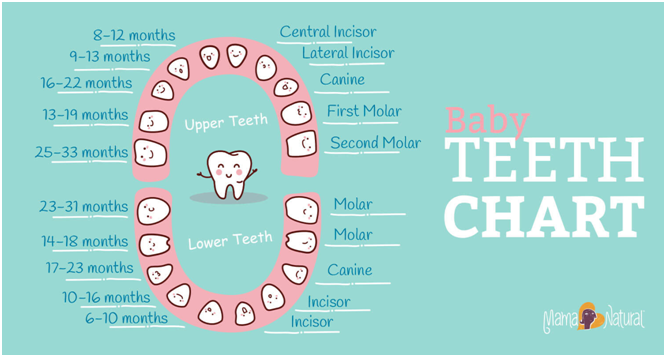What you need to know.
Teething can be an uncomfortable time for both, you and the baby! The experience varies from child to child however the more you know the more prepared you can be so we have in this article answered questions that parents ask concerning teething such as “When Do Children Start Teething?”, “What To Expect With Teething”, “How to Help With Teething” and “When To Start Looking After a Child’s Teeth?” Hopefully, this will cover all your concerns about teething, if not, just contact us at Dentistry on Coolum.
When Do Children Start Teething?
On average, babies start teething when their first teeth can come out at 6 months’ time. Don’t be alarmed if your child starts teething it’s a little sooner or later than this as variation is completely normal. In premature babies, the eruption of teeth can be delayed.
Teeth normally erupt in pairs. The first teeth to come through are the lower middle teeth (central incisors) at around 6 months of age. Following this, the upper middle teeth come through a couple of months later. Two months after this, the upper on lower lateral incisors begin to emerge.
The first baby molars (back teeth) start coming through at the 12-14 months old. These are larger than others and can often cause increased discomfort as they are breaking the skin. The 4 canine teeth come through at 18 months and finally the second molars at 2 years of age.
What To Expect With Teething
How will I know if my child is teething?
• Red or swollen gums
• Excessive drooling
• Irritated behaviours like face rubbing or ear pulling
• Increase in biting or sucking behaviour
• Rejecting food
• Disturbed sleep
Teething may not be the only causes for these symptoms so consult your paediatrician if there are any concerns.
Teething usually lasts a few days at most and goes away with time. Babies are not ‘used to’ the discomfort they experience when they start teething so they express this discomfort more. Your child may wake up several times during the night when they start teething.
Teething Help
What can I do to help?
• GENTLE GUM MASSAGE: With clean fingers, gently rub the sore areas. The pressure can provide palliative relief
• COLD/CHILLED WET CLOTH: Allow your child to gnaw on the cloth. This can help with the swelling and the pressure can help with the pain
• TEETHING TOYS: Soft plastic or rubber toys are safe for your child to nibble on. The gentle stimulation can aid healing.
• Medicine: Consult your paediatrician or dentist if any medicine may help.
Some mums are concerned about breastfeeding during this time. Each child will be different. Some children will have no issues and find it soothing while others may find it uncomfortable. Gently massage the gums again before trying again. If they bite, suddenly pull away and they will get the idea.
Looking After Children’s Teeth
When should you start looking after your child’s teeth?
You should start cleaning your child’s teeth pretty much when they start teething, that is when the teeth come through. At this stage, fluoride toothpaste is not necessary as they will just tend to swallow it. The water may contain fluoride which will help. Cleaning with clean fingers or a wet cloth is ideal. Around the age of 2, all baby teeth should be present. Around this time, your child can work up to small, less than a pea-sized child fluoridated toothpaste twice a day.
Dentistry On Coolum
By the 2nd Birthday, we recommend that your child should visit the dentist for at least a ‘ride in the chair’ to start a positive relationship regarding their oral health as opposed to coming when there is a problem. Your dentist will check if the teeth and gums are nice and healthy, as well as if their jaws are developing properly.
Author: Dr Monil Gohil from Dentistry on Coolum


